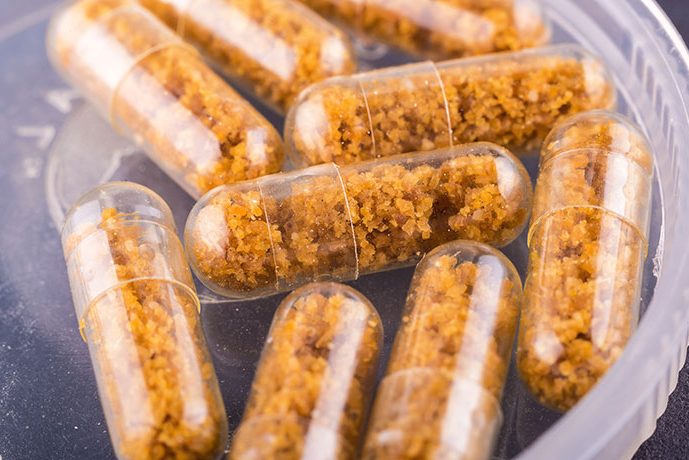However, it helped solve some cases of metabolic syndrome. Mixed results were observed after a fecal microbiota transplant (FMT) with oral capsules in obese adolescents, according to a randomized trial.
Fecal transplants in children: results
When looking at 87 children from New Zealand, those who underwent a single cycle of FMT with oral capsules did not see a significant benefit with respect to the standard deviation score of the body mass index (BMI) after 6 weeks (difference of adjusted means [aMD] – 0.026, 95% CI – 0.074 to 0.022), Justin O’Sullivan, PhD, from the University of Auckland in New Zealand, and colleagues at JAMA Network Open reported.
The fecal transplant, however, produced some other benefits, including a significant reduction in the ratio of android to gynoid fat at various time points compared to those who took a placebo:
After 6 weeks: aMD – 0.021 (95% CI: -0.041 to -0.001)
After 12 weeks: aMD – 0.023 (95% CI: -0.043 to -0.003)
After 26 weeks: aMD – 0.029 (95% CI: -0.049 to -0.008)
A post hoc exploratory analysis also found that obese children who met the criteria for metabolic syndrome at baseline were more likely to have their metabolic syndrome alleviated 26 weeks later with a FMT, compared to the placebo group (odds ratio adjusted 0.06, 95% CI 0.01 -0.45, P = 0.007). In total, only 4 of the 18 participants with metabolic syndrome at baseline still suffered from the condition after the fecal transplant. On the other hand, 10 of 13 cases of metabolic syndrome remained in the placebo group.
Those who received the FMT also observed a small change in the bacterial community composition as seen through the profile of the gut microbiome, and this change was maintained for up to 12 weeks after the transplant. Nonetheless, at this point, the benefits had ended, as there were no significant benefits in insulin sensitivity, liver function, lipid profile, inflammatory markers, blood pressure, total body fat percentage, gut health and health-related quality of life after the fecal transplant.
The transplant was safe and no participant experienced serious adverse events. The most common minor adverse events reported were soft feces, changes in bowel movement frequency, and abdominal pain. “We believe that FMT may be a feasible future treatment for obesity and/or metabolic diseases, but targeted microbial therapy with a defined cultured microbial mixture is likely to be more socially acceptable and safe”, the researchers noted.
They suggested that future trials in this area “should, therefore focus on identifying the organisms and mechanisms responsible for mediating the benefits observed in the presence of dietary restriction”.
Fecal transplants in teenagers: results
The double-blind trial included 42 post-pubertal adolescents who underwent FMT, compared to 45 who received a placebo. The participants were between 14 and 18 years of age and had a BMI of 30 or more at study baseline.
The fecal microbiota came from 8 healthy lean donors; four men and four women, with the microbiota dually encapsulated in release-delay hydroxypropyl methylcellulose capsules (Capsugel). Prior to the transplant, participants performed a bowel emptying with a 70 g oral bowel wash solution the day before, followed by an overnight fast. Each participant received 7 capsules from each of the same-sex donors for a total of 28 capsules over 2 days (a total of approximately 22 grams of humid fecal matter).
In the first 6 weeks after the transplant, teenagers who received the intervention observed a significant decrease in BMI, but this improvement disappeared after 6 weeks compared to the placebo group (BMI standard deviation score aMD 0.91, CI 95%: 0.34 to 1.49, p <0.001). Similarly, those who received the intervention also observed a significant 34% improvement in the Homeostatic Model Assessment of Insulin Resistance (HOMA-IR), a 29% reduction in fasting insulin, and a 7% reduction in fasting glucose within the first 6 weeks after the transplant, but these benefits were not maintained either.
Link: https://www.sochob.cl/web1/el-trasplante-de-microbioma-fecal-no-ayuda-mucho-en-la-obesidad-pediatrica/
Date: December 22nd, 2020
Source: https://www.medpagetoday.com
Reference: Leong KSW, Jayasinghe TN, Wilson BC, et al. Effects of fecal microbiome transfer in adolescents with obesity: the gut bugs randomized controlled trial. JAMA Netw Open. 2020 Dec 1;3(12):e2030415.
Nutrigenomics Institute is not responsible for the comments and opinions included in this article






